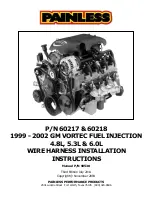
Century and Neptune
motors have superior
resistance to moisture, but you should avoid placing
the motor where it can be splashed. Avoid installing the
motor in low spots where it could collect water and be
flooded. In fact, it’s probably a good idea to elevate the
motor at least two inches off the ground.
Before you turn
the motor on,
check to see that the line voltage, phase and frequency
match the specifications shown on the motor name-
plate. Current capacity must be adequate enough to
maintain rated voltage at the motor terminals under
all conditions. If it’s too high, contact the local utility.
If it’s too low check for overloaded circuits, loose
connections or wire of the wrong gauge (see wire
selection guide).
Generally, motors will
run hotter with increasing
altitudes. For installations more than 3,300 feet above sea
level, it’s advisable to use a motor with the next
larger horsepower rating than the one recommended
for that application at sea level or use a A.O. Smith E-Plus
(High Efficiency) motor of the same rating when available.
Fastening the pump and
motor assembly securely
to a foundation or base will prevent vibration, loosening,
and future misalignment. Make sure that the motor and
pump assembly rotate freely before starting the motor.
14
M O I S T U R E
P O W E R S O U R C E
A L T I T U D E
M O U N T I N G
















































